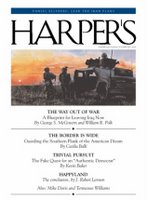Lennon, J. Robert. "Happyland: A Novel." Harper's. Oct. 2006: 41-61.
 Finished! I want at least one of the half-dozen or so magazines I subscribe to to serialize a novel at any given time. No wonder Dickens is so famous. D.F. Wallace in past essays or interviews has theorized the ways reading books are like dating people (or maybe it was J. Franzen, whom such a thing sounds so like), in that you have that time you were together, and with good books you look back on it fondly, and sometimes with the possibility of getting together again sometime. Very straight-man, sure, but that's kind of what it's like to read a novel in serialization. Or, rather, if such a metaphor between reading and dating exists, it's enhanced by reading a novel in serialization.
Finished! I want at least one of the half-dozen or so magazines I subscribe to to serialize a novel at any given time. No wonder Dickens is so famous. D.F. Wallace in past essays or interviews has theorized the ways reading books are like dating people (or maybe it was J. Franzen, whom such a thing sounds so like), in that you have that time you were together, and with good books you look back on it fondly, and sometimes with the possibility of getting together again sometime. Very straight-man, sure, but that's kind of what it's like to read a novel in serialization. Or, rather, if such a metaphor between reading and dating exists, it's enhanced by reading a novel in serialization.I want to quote from the penultimate paragraph which won't I think ruin anything for those of you who haven't Finished! the book yet. I want to quote it to you because it's probably the exact reason I love reading novels like this one—i.e., realistic novels about everyday people's struggles (how gauche of me to admit that I like these!):
... How many months did [Ruth, the librarian of this town's small college] spend spinning fantasies of putting Happy [the doll mogul who's moved in and taken over the town] in her place? How many times has she spoken to the showerhead, the rhododendrons, the computer screen, the stacks, delivering snappy put-downs, devastating rebuttals, righteous diatribes? More than she could count. You'd think the trial would have been enough to satisfy Ruth Spinks, but her moments in the witness box were a disappointment, diluted as they were by formal civility and hostile cross-examination, the long-hoped-for verdict offset by the town's humiliating admission that it had been deceived. And so, no, there was no satisfaction: quite the opposite, in fact. Only leaving here, Ruth reasons, will purge Happy Masters at last fom her mind; only putting these miserable years behind her for good will bring her peace. She imagines what lies ahead: pulling away from the curb, Equinox receding in the sideview mirror, the drive downstate and into the city. For dinner tonight, she will visit the Vietnamese place around the corner from her building, and she'll sleep on the floor, like a student, beside the clanking radiator. The smell of the previous occupant's cat will wrinkle her nose, and the sound of traffic will wake her before dawn. She'll get up, and buy a paper, and read and smoke and drink coffee in blissful—and permanent—solitude. All that, mere moments and miles away.Putting aside the texture of the prose and the way the paragraph hinges on "no" and "satisfaction" what I love about this is how instructive it is. "Here, Dusty," it says, but probably uses my real name. "Here is how lives are lead."
This is probably me overrationalizing the simple fact that Ruth is the character I, and I imagine most readers, relate to the most. But getting me to connect enough with a character that want to watch her be well in life is another feat about which I'm happy to spend hours chatting.


0 Comments:
Post a Comment
<< Home